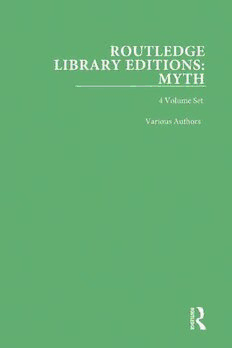
Routledge Library Editions: Myth, 4-Volume Set PDF
Preview Routledge Library Editions: Myth, 4-Volume Set
ROUTLEDGE LIBRARY EDITIONS: MYTH Volume 1 MARTIN BUBER ON MYTH MARTIN BUBER ON MYTH An Introduction S. DANIEL BRESLAUER Firstpublishedin1990 Thiseditionfirstpublishedin2015 byRoutledge 2ParkSquare,MiltonPark,Abingdon,Oxon,OX144RN andbyRoutledge 711ThirdAvenue,NewYork,NY10017 RoutledgeisanimprintoftheTaylor&FrancisGroup,aninformabusiness ©1990S.DanielBreslauer Allrightsreserved.Nopartofthisbookmaybereprintedorreproducedor utilisedinanyformorbyanyelectronic,mechanical,orothermeans,now knownorhereafterinvented,includingphotocopyingandrecording,orinany informationstorageorretrievalsystem,withoutpermissioninwritingfromthe publishers. Trademarknotice:Productorcorporatenamesmaybetrademarksorregistered trademarks,andareusedonlyforidentificationandexplanationwithoutintent toinfringe. BritishLibraryCataloguinginPublicationData AcataloguerecordforthisbookisavailablefromtheBritishLibrary ISBN:978-1-138-82525-3(Set) eISBN:978-1-315-73033-2(Set) ISBN:978-1-138-84060-7(Volume1) eISBN:978-1-315-73277-0(Volume1) Publisher’sNote Thepublisherhasgonetogreatlengthstoensurethequalityofthisreprintbut pointsoutthatsomeimperfectionsintheoriginalcopiesmaybeapparent. Disclaimer Thepublisherhasmadeeveryefforttotracecopyrightholdersandwould welcomecorrespondencefromthosetheyhavebeenunabletotrace. MARTIN BUBER ON MYTH An Introduction S. Daniel Breslauer (CP) GARLAND PUBLISHING, INC. • NEW YORK & LONDON 1990 © 1990 S. Daniel Breslauer All rights reserved Library of Congress Cataloging-in-Publication Data Breslauer, S. Daniel. Martin Buber on myth : an introduction / S. Daniel Breslauer. p. cm. — (Theorists of myth ; vol. 3) (Garland reference library of the humanities ; vol. 918) Includes bibliographical references and index. ISBN 0-8240-3721-9 (acid-free paper) 1. Buber, Martin, 1878-1965—Contributions in concept of myth. 2. Myth—History—20th century. I. Title. II. Series. HE. Series: Garland reference library of the humanities ; vol. 918. B3213.B84B74 1990 291.1 '3 '092—dc20 90-38866 CIP Printed on acid-free, 250-year-life paper, Manufactured in the United States of America SERIES EDITOR’S FOREWORD As a Jewish thinker and philosopher of religion, Martin Buber needs no introduction. Daniel Breslauer, an authority on Buber and author of The Chrysalis of Religion: A Guide to the Jewishness of Buber's “I and Thou” provides a pioneering analysis of Buber as a theorist of myth. Breslauer not only points to Buber’s interpretation of myths worldwide but, far more, reconstructs the theory of myth implicit in Buber’s interpretation of Jewish myths in particular. Myth for Buber originates in the mythmaker’s encounter with God and, in recording that encounter, functions to evoke a similar encounter in the reader of the myth. Buber is hardly the sole theorist for whom myth serves to trigger experience, and Breslauer contrasts Buber’s view to the views of, among others, Mircea Eliade and Carl Jung. Where for Eliade myth liberates one from the fallen, present world and returns one to the time of the primordial experience that inspired the myth, for Buber myth enables one to garner in the everyday, present world an experience akin to the original experience. Where for Jung both experiences are really of the unconscious, for Buber both are truly of God. Breslauer most helpfully contrasts Buber’s theory of myth to the theories of various others—among them Rudolf Bultmann, Adolf Jensen, Theodor Reik, and William Robertson Smith. Breslauer does so in the process of presenting in detail Buber’s interpretations of the Biblical myths of creation, Adam and Eve, Enoch, Moses, Job, and Psalms. Where many, though not all, Biblicists have conventionally praised the Hebrew Bible as historical rather than mythic, Buber declares the Bible mythic and historical alike. Indeed, myth and history work SERES EDITOR’S FOREWORD hand in hand. History roots myth in actual, concrete events, and myth transforms history from merely a record of past events to an ever- beckoning opportunity for present ones. Myth keeps religion alive. Like most Biblicists, Buber still pits Judaism against paganism, but the opposition is no longer between history and myth. It is between one variety of myth and another. Breslauer attends most fully not to Biblical myths but to Hasidic ones. Here, too, he contrasts Buber’s view to the views of others— most notably, Gershom Scholem. Here, as elsewhere in the book, Breslauer continually places Buber’s theory of myth within his overall philosophy. Buber, we are told, asks of myth what he asks of life as a whole: openness to other persons and things as well as to God. Breslauer notes that Buber, for all his advocacy of myth, acknowledges its limitations—limitations that, it might be pointed out, are close to the ones that Jung, a fellow evangelist for myth, grants. For both Jung and Buber, myth can capture only a portion of the experience that engenders it. For Jung, the inexhaustibility of any of the archetypes that comprise the unconscious guarantees that myth will fall short of encompassing all of its subject. For Buber, the third- person, “I-It” nature of the medium skews the second-person, “I-Thou” message. Yet both laud myth for encompassing as much as it does. Both write to revive myth for modems, who miss its meaning and power by literalizing it. Both berate those who spurn myth as merely primitive. Where Buber, who subsumes myth under religion, urges modems to return to the myths of their traditional religions, Jung, who allows for secular myths, beseeches modems to seek myths outside of religion as well as within it. As admiring of Buber as Breslauer is, he is not uncritical. He concedes that Buber’s imaginative readings at times fit Buber’s theory better than the myths themselves. Breslauer faults Buber at once for defining myth too broadly and for taking the function of myth too narrowly. In passing, Breslauer gingerly broaches some of the criticisms of Buber’s underlying philosophy itself—most conspicuously, the core distinction between “I-Thou” and “I-It.” Overall, Breslauer’s sympathetic and patient analysis makes his book a fine introduction to Martin Buber as theorist of myth.
